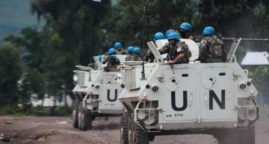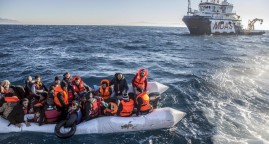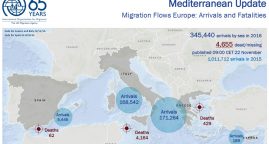One year after humanitarian summit, UN stresses reforms to put people ‘at heart’ of decision-making
Article published on UN website on 05/23/2017
The 2016 World Humanitarian Summit in Istanbul rallied global actors to save lives and protect the most vulnerable, but with the number of people in need growing, the international community must use resources better and galvanize new partnerships, top United Nations officials said today.
“Humanitarian assistance alone cannot sustainably reduce the needs of over 130 million of the world’s most vulnerable people,” UN Secretary-General António Guterres said in a statement marking the first anniversary of the Summit.
“We must engage our collective strengths and mobilize new partnerships to prevent and end conflicts, reduce vulnerability to natural hazards and address the root causes of fragility,” he continued. “We must bring humanitarian and development actors to work together closely from the beginning of a crisis to support affected communities.”
“Delivering the New Way of Working is a critical step to achieve this,” Mr. Guterres said, referring to an agreed-upon concept at the Summit of groups and organizations working based on the comparative advantage towards collective outcomes. It emerged from the Agenda for Humanity, which outlines the changes that are needed to alleviate suffering, reduce risk and lessen vulnerability on a global scale.
“These are some of the driving factors behind my vision on prevention and my commitment to reform the way the United Nations works, in order to put people at the heart of our decision-making,” the UN chief said, stressing that prevention of human suffering is his top priority.
Speaking to UN News ahead of the anniversary, the Under-Secretary-General for Humanitarian Affairs and Emergency Relief Coordinator, Stephen O’Brien, said that given the scale of the needs, the Summit allowed the humanitarian community to refocus on its priorities.
“It becomes less what we give and more how they can then demand rightly what is received to best support them,” Mr. O’Brien said.
He added that “it was really important that we together understood what differences we need to make in order to have a greater impact to relieve the suffering, to save lives, to protect civilians, particularly from harm and conflict, “but above all to give people the chance to hope and a better life as well.”
The Summit was built around five core actions , part of the Agenda for Humanity and which include respecting the rules of war and leaving no one behind.
As part of the Summit, for example, Governments and organizations endorsed a charter agreeing to improve living conditions for people with disabilities during emergencies.
In addition, Governments, civil society, UN agencies and other partners committed to taking actions which fit within the Agenda.
“If we get all five right, then we will be doing our very, very best in the world,” Mr. O’Brien said.
Related Articles
Peacekeepers Shouldn’t Always Be Peaceful
04/19/2018. The United Nations needs to accept that it’s possible to fight and broker peace agreements at the same time.
MOAS and Order of Malta saving lives of migrants
03/10/2016. Despite warnings regarding Europe border closures, forced migrants set off from Turkish to Greece.
Mediterranean Migrant Arrivals Reach 345,440; Deaths at Sea: 4,655
11/22/2016. The Central Mediterranean route connecting North Africa to Italy has proved the deadliest passage, accounting for over 4,100 of this year’s drownings.





